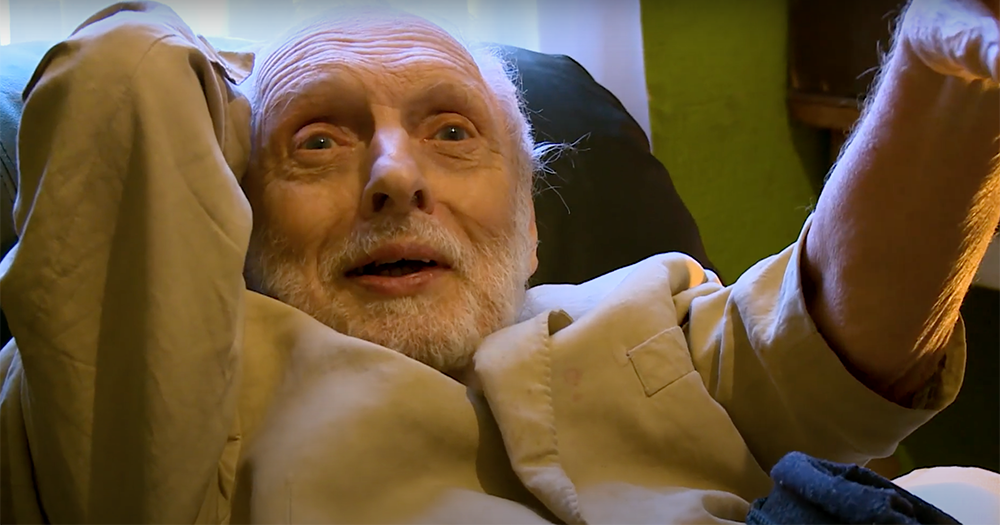While living in India, Simon Chambers received news that his uncle David in London was dying. Simon decided to travel back to the UK for a few months to care for his relative in the final stage of his life, but what he thought would be a brief stint turned into a five-year journey, a huge portion of which is documented in Much Ado About Dying.
The award-winning film, which received its world premiere at the 2022 Irish Film Institute (IFI) Documentary Festival in September, provides intimate insights into David’s last years as he navigates love, loneliness, illness, and the care system. Not to mention having his house burn down in the middle of it all.
Simon, who acts as filmmaker and caregiver all in one, also plays an important role in Much Ado About Dying, and spoke to GCN about the production.
Opening the conversation, Simon immediately described David as “eccentric”, “out there” and “very theatrical”. Although it’s a film about dying, “it’s actually a very funny film because my uncle is such a funny character,” he explained.
David is a gay man and former actor, so it’s somewhat unsurprising that these characteristics are most noteworthy. Also, an avid Shakespeare fan, although he couldn’t remember where he left his dentures, “he could remember huge tracts of Shakespeare, and he’d just start sort of performing in front of the camera,” Simon remembered; in between cursing the hours they spent “looking everywhere for the bloomin’ false teeth”.
“His life was very parallel to King Lear,” he continued. “[The play] is about an old man who’s going a bit bonkers and he decides to give away his kingdom to his three daughters and it all turns out badly. And in a way, that’s what David did. He decided to give away his money, and he wants to give away his house to the people that were helping him.”
Irish / UK film wins at world’s biggest documentary festival @idfa @ScreenIreland pic.twitter.com/1jquca8evm
— Much Ado About Dying (@MuchAdoDying) November 17, 2022
While his flamboyant nature makes the film incredibly charming, there is much more value in the production than simply entertainment.
Isolation in old age is a prominent theme, as is the struggle of being a caregiver. It’s often a thankless job, and Simon said: “If you’re a family member, then quite often the family take you for granted. They just think that you’re there to do everything.”
He continued: “I tried in the film to get down all the experiences of what it’s like looking after a family member. And I did a bit of research, and in Ireland, there are actually half a million unpaid family member carers most of whom are looking after older people.”
This aspect of the film has received particular praise from audiences, and at the IFI screening, various people thanked Simon for “showing the experience that [caregivers] have, of the loneliness, the frustration, the anger, the way it makes us so tired”.
Ultimately though, it is a powerful and uplifting film, largely due to David’s refreshingly positive outlook on life.
“That’s the thing I learned from him. One of the benefits I got was to actually be more playful in life and treat my life more playfully,” Simon revealed.
“Because there’s nothing more extreme than your house being burnt down, you’ve lost everything, you’ve got cancer, you’re going to die, and you’re still singing ‘I Will Survive’.”
Don’t miss out on seeing Much Ado About Dying, releasing in Irish cinemas on May 10.
© 2024 GCN (Gay Community News). All rights reserved.
Support GCN
GCN is a free, vital resource for Ireland’s LGBTQ+ community since 1988.
GCN is a trading name of National LGBT Federation CLG, a registered charity - Charity Number: 20034580.
GCN relies on the generous support of the community and allies to sustain the crucial work that we do. Producing GCN is costly, and, in an industry which has been hugely impacted by rising costs, we need your support to help sustain and grow this vital resource.
Supporting GCN for as little as €1.99 per month will help us continue our work as Ireland’s free, independent LGBTQ+ media.
